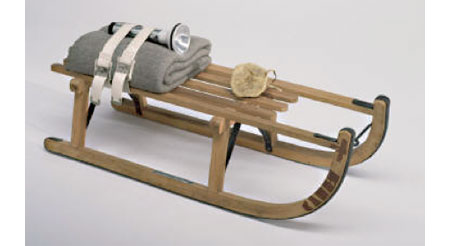
Joseph Beuys, "Schlitten (Sled)," wooden shed stamped with oil paint, felt, belts, flashlight, fat, rope
13 3/4 x 35 3/8 x 13 3/4", at LACMA
Continuing through July 18, 2010
In post World War II Germany, when Joseph Beuys began issuing multiples of mundane articles such as felt, fat, tin cans, political posters and postcards at affordable prices, it's unlikely that the populist German artist ever envisioned the display of nearly all six hundred of his widely circulated multiples in a building that bears the name of the man who amassed this collection, Eli Broad. Although Beuys said, "if you have all my multiples, you have me entirely," he intended the mass distribution of his inexpensive offerings to be a means to "spread ideas," beginning with the myths he fabricated around the difficult period of his life following his service in the German Luftwaffe.
Viewers older than the current crop of art school grads may be familiar with Beuys' 1974 performance, "I like America and America likes me." In that action, the charismatic Beuys swathed himself in felt and interacted with a coyote (who urinated on copies of the Wall Street journal strewn across the gallery floor). Beuys' three-day performance in the René Block Gallery in New York, addressing the debasement of native Americans, irked those who were already angered by his opposition to American military actions in Vietnam. Of the six thematically organized rooms that comprise this exhibition, those involved with issues of particular concern to Beuys, including political activism, education and the environment, have moved from the margins and into the mainstream.
